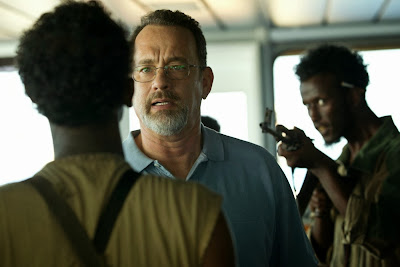Friday, 18 October 2013
Captain Phillips (2013, Paul Greengrass)
In April 2009, Captain Richard Phillips and his crew of the Maersk Alabama were seized by pirates off of the Somalian coast whilst in international waters. The first US ship to be seized upon in 200 years. Here, the ordeal of the now controversially heroic Phillips is dramatised in a more clear cut case of every-men facing great adversity. With director Paul Greengrass at the helm, we're given a lean, straight talking procedural, but it's the game raising emotional element of Tom Hanks in the lead that sets this one above an average 'real world' thriller.
The sense of dread is overwhelming in a film like this; we all head into the cinema to watch drama played out, to see equilibrium restored, or perhaps not in more cynical cases. But when we're taken through a real world experience in a film - and taken through it well - the cost naturally feels greater. Paul Greengrass has done this before with the brilliant Bloody Sunday, and United 93. His penchant for detail and background in documentary form creates a sense of pulsating reality that he creates and then eavesdrops on. We know what inevitable experiences lie ahead for these characters and we watch them get consumed by them.
Tom Hanks as Philips rests the film entirely on his shoulders and carries it in confidence the whole distance. His performance is like watching an elastic band being pulled and tested, you can see an end to Philips' calm persona as the hijacking carries way past what it should have been. His quick wit and brave handling of situations helps save the lives of his crew while putting his own in danger. As the situation escalates and the stakes are raised, the desperation begins to break through and Hanks is utterly convincing as a man who fears he may never see his family again. By the end, Hank's emotional breakout is remarkable in its power, a turn from an actor who hasn't been this good in 20 years. And why does this emotional payoff, well, payoff? Because of the film's firm withstanding from sentimentality.
Take, for instance, the fact that Catherine Keener as Philips' wife is barely on screen for 5 minutes. His children have grown and one has moved out but we don't see or hear either. Keener is undoubtably one of the finest actresses in the US but the film conveys the distance, the longing, the fear through Hank's face and voice, not through superfluous scenes that condescend with false emotional injections. Hank's performance, and the film's tackling in general, can be summed up in a wonderfully short scene in which Philips, fearful of an imminent pirate attack, wife Andrea. His writing is short, unexpressive, and matter of fact, his anxiousness repressed. He lingers silently at the screen and we know he wants to say everything he's ever wanted to say to his love but he doesn't, he remains steadfast and refuses to give into his emotions until the situation has been handled.
The action is superbly shot with the desperate immediacy we've come to expect from Greengrass, edited with a surgical precision. It's a pleasure to see that the director's guerilla style of shooting has retained its muscular edge after much copycatting in recent years; he may not be saving up for a tripod yet, but with the material he's drawn to at this stage in his career the clashing of style and content isn't a worry right now.
In the film's wonderfully built climax the navy are involved, snipers issued, and multiple lives hang in the balance. The scenes relayed from the control rooms - Greengrass is a proven master of these - propel events forward while remaining full of military jargon, never bowing down to anything less than authentic. The placing of action and the logistics involved are superb and remind of how standards have fallen among the genre, here is the work of craftsmen who know where to position a camera and when and where to connect images through tightly knit editing.
There is a concern as the film hurdles towards its finale that some blunt edges of the story may sit awkwardly if left undeveloped; issues of racial representation that caused the otherwise impressive Argo to appear clumsily xenophobic. Philips' sees the conflict in the heart of his captors, most evidently in the youngest but also their leader played by non-actor Barkhad Abdi. He identifies with their cause, with their hardship, and the cutthroat world they inhabit whilst wanting desperately to escape it. Stockholm Syndrome sneaks into the mix and when Philips' releases that emotion at the end, when that catharsis is finally opened up, we sense that he isn't just crying for himself or his family, but for the Somalian pirates and ultimately for a world that forced their hand.
Captain Philips isn't just a thrill ride, and though disputes between what actually happened on the Maersk Alabama and what is depicted here will be challenged for years to come, we're left with a shining example of humanist cinema.
Labels:
2013,
Captain Philips,
film review,
Paul Greengrass,
Tom Hanks
Subscribe to:
Post Comments (Atom)


No comments:
Post a Comment